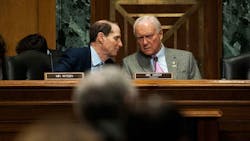Lawmakers Reach 'Fast Track' Deal to Ease Obama's Path to Pacific Trade Agreement
WASHINGTON - Senior U.S. lawmakers reached a deal Thursday to make it easier for President Barack Obama to negotiate trade accords, including a massive deal with 11 other Pacific nations.
If Congress grants Obama so-called "fast-track" authority, it would let lawmakers vote to approve or reject the proposed Trans-Pacific Partnership (TPP) but prevent them from introducing changes to the largest accord since the North American Free Trade Agreement.
The legislation "contains the clearest articulation of trade priorities in our nation's history," said Senate Finance Committee chairman Orrin Hatch, who reached the deal with the panel's top Democrat Senator Ron Wyden, and House Ways and Means Committee chairman Paul Ryan.
"We intend to move expeditiously on these bills," Hatch told a committee hearing.
House Speaker John Boehner, who has long pushed for a new trade policy, hailed the deal and said it would "strengthen" congressional authority over a final trade accord.
U.S. Trade Representative Michael Froman gave a cautious thumbs up to the legislation.
"At first glance we see very important developments in terms of negotiations objectives," Froman said, mentioning progress on preventing unfair competition from state-owned enterprises and safeguards for U.S. products including agriculture.
Tough Battle Ahead for Trade Legistration
A tough legislative battle over "fast-track" authority lies ahead. A Senate aide said lawmakers want to start the process quickly so the wrangling does not drag deep into the 2016 presidential race.
Congressional authority over trade deals has been a point of contention for years, with critics warning that secret negotiations and hurried votes hurt American workers.
"There's too much at stake for Congress to be rushing through a bill that would allow more NAFTA-style trade deals," said Senate Democrat Sherrod Brown, citing a loss of millions of U.S. manufacturing jobs since 1994.
The Sierra Club called the agreement "toxic" for the environment and a replay of a failed trade authority model that strips out vital protections.
The Trans-Pacific Partnership is a trade framework negotiated between Australia, Brunei, Canada, Chile, Japan, Malaysia, Mexico, New Zealand, Peru, Singapore, the United States and Vietnam.
By Michael Mathes
Copyright Agence France-Presse, 2015
About the Author
Agence France-Presse
Copyright Agence France-Presse, 2002-2025. AFP text, photos, graphics and logos shall not be reproduced, published, broadcast, rewritten for broadcast or publication or redistributed directly or indirectly in any medium. AFP shall not be held liable for any delays, inaccuracies, errors or omissions in any AFP content, or for any actions taken in consequence.
